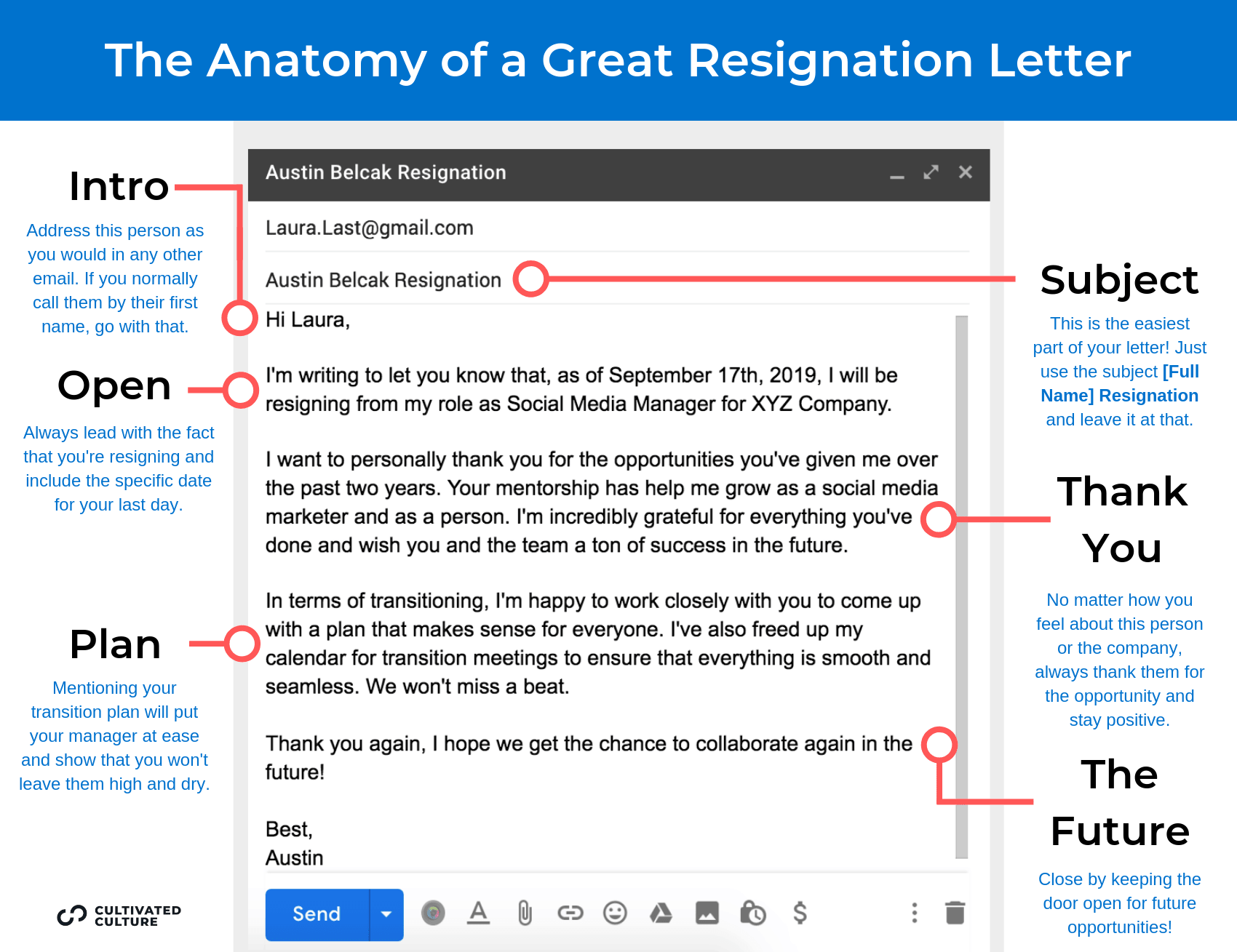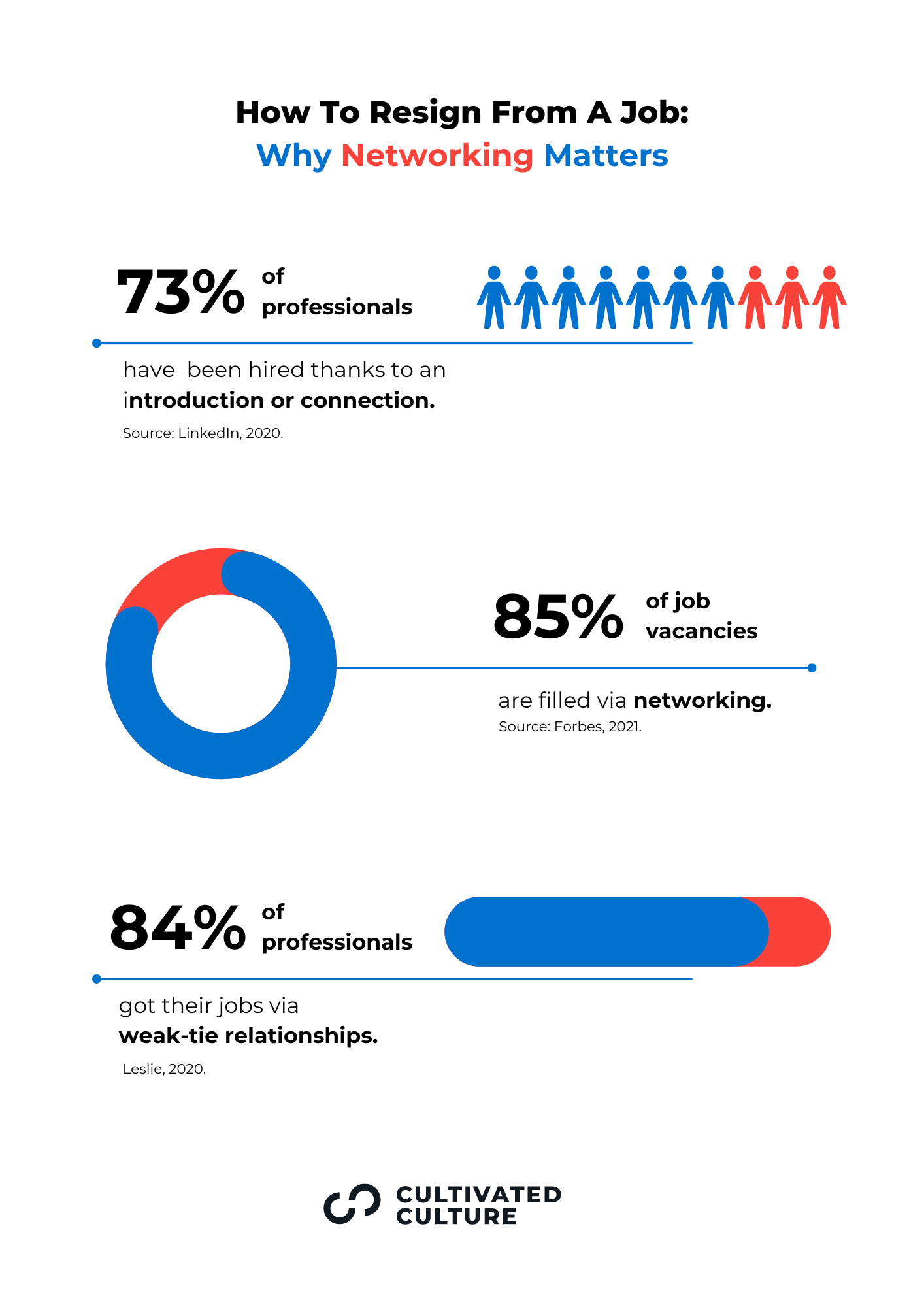You’ve finally decided to take the plunge and resign from your current job. Congrats!
I hope you landed an awesome new opportunity that's going to catapult your career. Or that you're moving across the country (or the world!) for a change of pace. Or maybe you just need a break from the chaos of the professional world!
Whatever your reason, resigning the right way will help you keep your reputation intact and all of your doors open down the road. There's no better way to do that than via a sit down conversation with your boss and a formal resignation letter.
While it doesn’t have to be long or complex, your resignation letter is more important than you might think. It covers you legally, it's an act of respect, and your supervisor might even reference it if they need to craft a recommendation for you. Learning how to resign gracefully is a skill that will pay major dividends throughout your career.
In this post, we'll cover:
- Why Do You Need To Write A Resignation Letter?
- How To Write A Resignation Letter: The Essential Aspects Of A Formal Resignation Letter
- How To Resign From A Job (And Leave On Good Terms!)
- How You Should Deliver Your Resignation Letter (Hand-Written Note, Email, etc.)
- The Best Resignation Letter Template (Copy & Paste!)
- Best Resignation Letter Examples For Specific Scenarios
- Final Tips For Resigining A Job Without Burning Bridges
Finally, I’ll give you five templates you can use to draft your own resignation letter, as well as several examples of letters you might use to resign in specific scenarios.
Why Do You Need to Write a Resignation Letter?
A resignation letter serves several key purposes, both professional and personal.
It serves as your official notice that you’ll be leaving the company. Many HR policies require a formal resignation letter, whether printed or by email, as part of your contract. Even if they don't, sending something in writing covers your butt legally in case anything crazy goes down.
Having your resignation helps make sure there's no confusion or verbal back-and-forth. A good resignation letter is clear-cut and leaves no room for miscommunication about if, when, and how you’ll be leaving.
Sending a resignation letter also allows your company to make plans for your transition out of the firm. They need to find and train your backfill, shift your projects to other team members, adjust any long-term plans, and a whole lot more.
Sending a resignation letter is just a common courtesy. You don't want to burn any bridges with your employer. Being polite and mapping out a plan will help smooth over any awkwardness during your last few weeks at work.
On top of that, it gives your employer enough time to prepare for life without you so that they aren’t scrambling to find an urgent replacement or pick up the slack on your projects.
Your resignation letter is a chance for you to exit your position without burning any bridges. By thanking your employer for the chance to work with your team, giving ample notice for the department to adjust to your departure, and engaging your supervisor as a professional until the very end, you’ll leave a good impression on the people you’ve worked with and keep the door open for future opportunities.
You never know when a former colleague might end up being a future interviewer or referral!
Most industries are small worlds — it’s important to maintain those positive relationships as you progress in your career. Your resignation letter gives you the perfect opportunity to do just that.
How To Write A Resignation Letter: The Essential Aspects of a Formal Resignation Letter
Your typical resignation letter is short, sweet, and to the point. It usually includes three basic elements:
- An official notification of the fact that you’ll be leaving and when
- A thank-you note to your supervisor and/or the company in general for the opportunity to hold your current position
- A sign-off including any essential notes about your upcoming transition out of the company. In some cases, the resignation letter might also include your reason(s) for leaving, if relevant and shareable.
Resignation Letter Template: What A Great Resignation Letter Looks Like
In case you're wondering, this is what a good resignation letter looks like:
We'll do a quick rundown of each here and then dive deeper in a minute.
#1 How To Start A Resignation Letter: State The Fact
Your resignation letter should start with a simple, straightforward statement about the fact that you're heading out along with your final day at the office.
#2 Show Gratitude
Next, you want to show gratitude for everything your company has offered you. If you are either writing a resignatino letter for a job you love or a job you hate, you should always show appreciation. Regardless of your reasons for leaving, you've probably learned a lot (good or bad) and added a few accomplishments to your resume.
#3 Bring In Examples Of What You Appreciated Most
You can wrap up this section with a few specific examples of what you appreciated most, how you’ve grown professionally, and what you’ll be taking with you into your future.
#4 How To End A Resignation Letter: Wrap Up With A Plan
Finally, your resignation letter should end with a plan to transition your projects over the next few weeks. Showing the company that you're not leaving them high and dry and will work to make sure things are smooth goes a long way, and it keeps a door open. If it's attractive and plausible, you could also include an offer to keep working as a freelancer/consultant depending on your role and the company's needs.
If you're looking for some side income or potentially making the jump to start your own business, this could be a great option to keep in mind.
Pro Tip: Keep Your Resignation Letter Professional & Positive
In most cases, people are looking to leave their companies as an escape. Things took a turn for the worse or didn't meet expectations from the start.
With that said, your resignation letter isn’t the place to express your complaints about the company or your supervisor.
While your concerns may be valid, your resignation letter is an official document that's going to be on the company's records for years to come. Every new employer you have might be giving them a call to validate your references and you don't want anyone digging up dirt when you're so close to landing that next opportunity.
Unlike a private HR matter, there’s no legal or professional expectation of complete privacy when it comes to your resignation letter. Make sure that the content is free of anything personal or sensitive. If you have major concerns, it's better to address them directly with HR or just forget about them and focus on what the future has to offer.
How to Resign From A Job (And Leave On Good Terms!)
You've probably heard that first impressions are lasting, right? Well, final impressions are just as important!
Your resignation letter is a huge part of how you’ll be remembered by your employer and your ability to maintain those professional relationships — which matter more than you might think, by the way! In fact, take a look at the statistics below:
Let's dive deeper into the components that make up an awesome resignation letter. Here are 4 tips to keep in mind.
Tip #1: Address This Person As You Normally Would
I see a lot of resignation letter templates that start with “Dear Mrs. So & So.” In most cases, you're going to be sending this letter to someone you know and have been working with.
When addressing your letter, introduce the person as you would in any other email. So if you normally email them and say “Hi John,” then start your resignation letter the same way. If your normal intro is “Hi Mr. [Last Name]” then use that.
There's nothing impolite or informal about using someone's first name in an email. If you already have a relationship with them, or you're a seasoned employee, it would almost be weird not to.
Tip #2: Thank Your Employer
I hope your reason for leaving is because you landed an amazing opportunity or you're finally starting that business! But sometimes our reasons aren't so positive — maybe you're escaping an awful boss or a position that limited your growth.
Either way, your resignation letter should express gratitude and appreciation. There's a positive to be found in every job, and your goal is to focus on it.
Thank your current manager and any other relevant colleagues for the opportunity to create and collaborate at your company. It’s also a good idea to provide at least one specific example of an experience that you’ll be taking from the current position into your next one, such as industry knowledge, positive memories of your coworkers, or the growth of your skills in a particular area.
Tip #3: Outline Your Plan For Transitioning Work
When an employee decides to resign, the first thing that pops into their manager's head is, “Oh no, how are we going to avoid losing momentum?”
Your resignation letter is the perfect opportunity to address that fear and take a big step towards leaving on great terms. It shows that you're not going to leave them high and dry and that you care about the future success of the team.
Your manager is probably going to be the person who outlines and finalizes the plan, all you need to do is let them know that you're willing to work with them and you're free to set up transition meetings with the person taking over your projects.
You can simply say, “I'm happy to work with you on a transition plan to help make things seamless. I've also freed up my calendar for meetings with anyone who will be taking over my projects.”
Tip #4: Leave The Door Open To Continue Your Professional Relationship
You never know when a former colleague will turn out to be a future interviewer or a potential referral at your dream job.
Your resignation letter should serve as more of a “goodbye for now,” rather than an end to the relationship with your colleagues.
You'll definitely want to be honest and clear about your resignation plans, but you should make an effort to ensure that your resignation letter mentions the possibility of working together again.
This is where the tone of your letter plays a critical role. If you focus on the positives, express gratitude for your growth, and make it clear that you're happy to put in the work to ensure a smooth transition, you should be in a great place to pick up the relationship again in the future!
How You Should Deliver Your Resignation Letter? (Hand-Written Note, Email, Etc.)
Should your resignation letter be a handwritten note or should you shoot your manager an email?
Traditionally, resignation letters were delivered as a physical, in-person copy. Ink on paper. But times have changed and the preferable way to communicate your resignations is through a resignation letter email.
First, you want to look at your employment contract to make sure there aren't any funky stipulations about a printed and signed resignation letter. Above all, you want to follow the process outlined in that contract because that is the legal language both parties must abide by.
If you have a choice, I always recommend starting by having an in-person conversation with your manager. Sharing this kind of news via email is like breaking up with your boyfriend via text — not great.
Once you've had the talk face-to-face, send your manager an email using one of the templates below. After you've sent it, make sure to forward a copy to one of your personal emails so you can keep it for your records.
While you hope that things go smoothly, you never know how companies and managers will react, so you want to be prepared for anything. Email creates a nice paper trail that can't be edited or doctored if push comes to shove.
The Best Resignation Letter Template (Copy & Paste!)
Now that you understand the purpose and basic outline of a typical resignation letter, let’s walk through a framework you can follow to craft your own.
First, we’ll go through an example step-by-step, breaking down each section and giving suggestions for what to include and how to word it.
Don't just copy and paste this example though! Use it as a starting point to express what you feel is appropriate given the amount of time you’ve spent in your current position, your accomplishments, and the nature of your resignation.
Part 1 – The Opening
The beginning of your resignation letter should open with a salutation, followed by a notice of your resignation and the date you plan to leave. Again, you can address this person the way you'd normally address them if you had to send an email to them on any given day:
“Hi Kate,
I’m writing to notify you that I will be resigning from my current role as the Assistant Director of Digital Marketing at MarketTrends, effective April 15th, 2026.”
Another example of appropriate wording is as follows:
“Dear Jared,
Please accept my notice of resignation from Tech College as the Associate Dean of Students. My last day at Tech College will be May 2, 2026.”
Both examples are simple, clear, and straight to the point.
There’s a wide array of possible tones to keep in mind here, ranging from business casual to highly formal. Like your salutation, the tone you choose to adopt in your resignation letter should reflect the usual tone of your company’s internal communications. Every team is different, so use your best judgment to decide how you wish to come across. If you’re not sure, short, sweet, and semi-formal is best.
Part 2 – The Expression of Gratitude / Thank You
Next, start a new paragraph to express your gratitude for the opportunity to work at your current company. You can mention whatever you feel is most relevant here:
- The amount of time you’ve spent in your current role
- Major projects you've worked on
- Guidance you received from a respected mentor or boss
- Relationships you cultivated along the way
- The skills/experience you consider to be the most valuable
The main point is to acknowledge the good things that came from working in your role (even if you can't wait to get the hell out of there!).
Here’s an example of what this section might look like:
“I’m really grateful for the past six years at TechVista You've been a fantastic mentor and you've helped me grow as a marketing professional and as a person. You challenged me to take on new projects and step outside of my comfort zone which is something I'll carry with me throughout my career.”
You can be effusive if you have a strong relationship and want to recognize that. If you're just ready to call it quits, you can be a bit more short and to the point. For example:
“Thank you for the opportunity to serve as part of the digital marketing team at Insights for the past three years. I will carry the valuable knowledge I gained about the landscape of digital advertising into all of my future professional endeavors.”
Part 3 – Closing, Transitions, & The Future
Your closing paragraph should focus on two things:
- Your plan to transition your projects and work
- Your desire to keep the door open for a relationship down the road
As we mentioned before, you want to let your manager know that you're ready and willing to make the transition as smooth as possible. You're available to train your backfill, to give people a download on your work/projects, and you're happy to collaborate with your manager to come up with that plan.
Next, before you sign off, you want to mention that you're always open to relationships or partnerships down the road. Here’s one example of a solid closing:
“In terms of transitions, I'm happy to help you come up with a plan. I want to ensure things are smooth and the team has everything they need to be successful after my departure.
Thank you again and wishing you all a ton of success. I hope we have another opportunity to work together in the future!
Best,
[Your Name]”
Best Resignation Letter Examples For Specific Scenarios
Every resignation scenario is different, so every resignation letter can be tweaked to reflect your unique circumstances.
Now that you’ve seen a step-by-step template of a resignation letter, let’s get into a few specific examples that could come in handy if you find yourself in an out-of-the-ordinary situation.
The Bare-Bones Resignation Letter Example
Let’s start with an example of a basic resignation letter without any special circumstances. Below is an example of a formal, hard-copy resignation letter that would be printed out and delivered in person:
May 3, 2026
Keisha Smith
Marketing Director
BlueTech
444 Downtown Ave.
New York, NY 11111Dear Keisha,
I am writing to let you know that, as of June 1st, 2026, I will be resigning from my role as Social Media Manager for BlueTech.
I want to personally thank you for the opportunity to spend two years on the social media team at BlueTech. Under your mentorship, I have learned a great deal about social media management and digital marketing as a whole. I'm deeply grateful for this experience, I know these skills will serve me throughout my professional career.
It's my goal to ensure that the transition of my work is smooth and the team doesn't lose momentum. I would be happy to sit down and discuss a transition plan with you. I've also freed up my calendar for sessions to train the people taking on my projects.
Thank you again for the opportunity to work on your team, I'm wishing you all a ton of success. I hope we get the chance to collaborate again in the future.
Sincerely,
[Hand-written signature]
[Your name]
If you were sending that same letter as an email, you can copy/paste the entire body text. Just make sure to remove the date and address header, then swap in a subject line that says [Your Name] Resignation.
Again, be sure to check your HR documents and employment contract for instructions on what format you need to use and whom you to send a resignation email.
Resignation Letter Example For When You’re Leaving Your Job for Another Opportunity
If you’re leaving your job for a better opportunity, feel free to disclose that if you feel comfortable. Remember that growth is a natural part of every career, and an entry-level- or mid-level job can often serve as a pathway to bigger and better opportunities. Great managers know this and will likely be supportive.
Here’s an example of a resignation letter template you can use when you're on your way to bigger and better things:
Hi Sam,
Please accept this letter as notification of my resignation from my position as Financial Analyst at Grow Fund. My last day will be Friday April 3, 2026.
I’ve grown both personally and professionally during my time at Grow Fund. I especially appreciated the opportunity to lean in and help perform the analysis for the Genesis deal. That experience is something I'll take with me for the rest of my career and I'm very grateful for that.
I’ve accepted a position as the Associate Director at another company, starting in May of this year. This opportunity gives me the chance to take on new challenges and, thanks to your mentorship, I know I'm prepared to take the step up.
I’m proud to have been a part of the capable team at Grow Fund, and I hope to continue our professional relationship in some capacity in the future.
Please let me know if I can be of any assistance during the upcoming transition. I look forward to watching Grow Fund’s continued success.
Best,
[Your name]
Resignation Letter Example For When You Need To Leave For Family Or Medical Reasons
If you need to leave your job for family or medical reasons, it’s often helpful to point that out, because it can help your supervisor understand that you might not be as available for help with the transition to your replacement.
That said, you absolutely do NOT owe your company any information about your personal health or family situation. A brief, general mention of the situation is sufficient.
Dear Claire,
I am writing to let you know that I will be leaving my current position at CrossPay on September 8, 2026. Unfortunately, we got a diagnosis in the family that will require more constant care and I won't be able to meet those needs and the expectations of my full time role here.
This is not an easy decision, I absolutely love working at CrossPay. You have been an amazing mentor, leader, and friend. I’m deeply grateful for the time I’ve gotten to spend here.
Thank you for your understanding of my family’s needs during this difficult time. If you're open to it, I would love to find a way to continue working together when things are in a better place.
Sincerely,
[Your Name]
Resignation Letter Example For Personal Reasons
There are plenty of personal reasons that might make you need to resign from a job: a career break, going back to school, focusing on your family…
Whatever the reason is, you decide how much information you want to share. If you are not comfortable disclosing too many details, a general mention will suffice.
Dear Amanda,
I am writing to let you know that, after much consideration, I have decided to resign from my position as Account Manager at Factor, with my last working day being May 15th, 2026. This is not an easy decision, but due to personal reasons that require my full attention at this time, I believe this is the best choice for both me and my family.
I want to thank you for the opportunity at Factor. Your mentorship was essential for my professional development over these past two years. I want to let you know that I am commited to ensuring a smooth transition and am willing to assist in finding and training my replacement.
Thank you once again and please feel free to book some time on my calendar so we can align further details.
Yours Truly,
[Your Name]
Resignation Letter Example For Relocation
So you and your family decided to move to another city or state — heck, maybe even another country!
First of all: congrats! Your resignation letter can express enthusiasm and, also, commitment to help in this transition while you haven't started packing yet.
Dear Ryan,
I am writing to let you know that I will be resigning from my role as a Business Analyst at GetBit, with my last working day being on April 5th, 2026. This decision comes as my family and I are relocating to another state — an exciting, yet challenging new chapter in our lives!
I want to deeply thank you for the opportunity to work at GetBit. Your guidance and mentorship have helped me evolve professionally and personally. Please rest assured that I am committed to making this transition as smooth as possible and will be re-assigning my current projects to the team until you find a replacement.
Please feel free to book some time on my calendar in case you have any questions.
Best wishes,
[Your name]
Resignation Letter Example For When You Need to Leave Immediately
Typically, the professional standard for notice is a minimum of two weeks before you leave a company.
However, sometimes an emergency, immediate opportunity, or extenuating circumstances makes that impossible. In that case, your resignation letter should reflect the potential inconvenience of your sudden departure and should make an effort to acknowledge that you will be as supportive as you can in the time you have left.
Additionally, it’s best to give a last-minute resignation letter via email, so that the relevant parties can be notified right away. Provide contact information so that your final paycheck and any questions can be forwarded to you as soon as you leave:
Dear Dr. Warren,
I am writing to notify you of my resignation from Lumiar School. My last day will be August 3, 2026. I know that this notice is short and I deeply apologize for that. Circumstances beyond my control have made it necessary for me to depart by 8/3 but I tried to extend things as much as possible.
I have enjoyed my experience as the Adjunct Professor at Lumiar School and I'm deeply grateful for the opportunity. Again, I apologize for the inconvenience of my sudden departure. The urgency of my resignation does not in any way reflect on the experience I’ve had in my position, which has been positive and fulfilling.
Please let me know what I can do between now and the 3rd to make this transition as easy as possible. I have freed up my schedule to make sure I'm available to help in any way.
After I leave I can be contacted at [phone number] or if you have any questions or need help.
Thank you for understanding, as well as for the opportunity to work with you for the past 3 years.
Best,
[Your name]
Resignation Letter Example For When You’re Retiring
If you’re finally retiring from your field, congrats! You made it to the promised land.
Your resignation letter can serve as a chance to reflect on what your career at the company has meant to you. A retirement letter is often a bit more heartfelt than other resignation letters and might include an option to help with the transition or recruitment of your replacement if that is of interest to you.
If you still want to stay active and involved, your retirement letter is also a great place to pitch that!
Here’s an example of an effective retirement letter:
Hi David,
I am writing to inform you that I will be retiring from Ambar & Co. effective May 2, 2026.
My 12 years at Ambar & Co. have been incredible. You don't find many companies who are as employee-focused as Ambar. Climbing the ladder from Associate, to Sales Manager, to VP has been a pleasure. I have watched the organization grow in profit and reputation, while maintaining the same sense of integrity and commitment to customer service that have always been its foundation.
I'm going to miss the teams and people I’ve worked with, but I know that Ambar & Co. is only going to continue to see a ton of success. I will always cherish the relationships and skills I fostered here.
During the upcoming transition, let me know how I can assist in finding and training my potential replacement. My personal email is , please don't hesitate to reach out if I can help in any way.
Sincerely,
[Your name]
Final Tips For Resigning A Job Without Burning Bridges
We've already covered a few reasons why your resignation letter is an important part of leaving your job gracefully, but there are a few other things you can do to make sure that your transition from your current position is as smooth as possible.
The first is making that conscious acknowledgment of the upcoming transition period and offering up your help. Outside of your resignation letter, you should also provide a comprehensive summary of your current duties to your supervisor, with all relevant files, documents, and information attached.
Depending on the level of seniority, you could also suggest which team members might be able to take over each of your ongoing projects based on their responsibilities and skill level. Then you can offer to train them up or, if you have the time, take part in hiring your backfill.
You should also clear out your physical space at work well before you leave, including both your desk or office and computer. Pay particular attention to any files that are sensitive or confidential, as they shouldn’t be floating around the office. Make sure that you leave a “blank slate” behind to make it as easy as possible for your replacement to take over from there.
During your final weeks at work, continue work as usual for the most part, in addition to any transitional tasks that need to be completed. Although it might be tempting to slack off or “check out,” stay as engaged as you always were so you leave the best possible lasting impression on your coworkers and supervisor.
And, of course, follow any additional HR policies about resigning and leaving your company. These might include returning any items your company let you use, such as a laptop, or surrendering logins and passwords.
Finally, remember that the ebb and flow of leaving a position and taking a new one is a normal part of career growth. Any manager you work with has likely encountered it many times in the past. There’s no reason to be nervous or apprehensive about the process as long as you conduct yourself with professionalism and follow the steps outlined above.
Happy resigning and here’s to your promising future!































